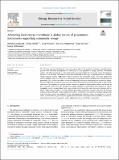| dc.contributor.author | Leonhardt, Reata | |
| dc.contributor.author | Noble, Bram | |
| dc.contributor.author | Poelzer, Greg | |
| dc.contributor.author | Fitzpatrick, Patricia | |
| dc.contributor.author | Belcher, Ken | |
| dc.contributor.author | Holdmann, Gwen | |
| dc.date.accessioned | 2023-03-08T17:26:34Z | |
| dc.date.available | 2023-03-08T17:26:34Z | |
| dc.date.issued | 2021-10-28 | |
| dc.identifier.citation | Leonhardt, Reata, Bram Noble, Greg Poelzer, Patricia Fitzpatrick, Ken Belcher, and Gwen Holdmann. “Advancing local energy transitions: A global review of government instruments supporting community energy.” Energy Research & Social Science 83 (January 2022): article no. 102350. DOI: https://doi.org/10.1016/j.erss.2021.102350. | en_US |
| dc.identifier.issn | 2214-6296 | |
| dc.identifier.uri | https://hdl.handle.net/10680/2044 | |
| dc.description.abstract | The adoption and encouragement of community energy, that is, the incentive to develop renewable energy projects with community participation and ownership, is a key ingredient of energy transition. Government policies and other instruments can pose both barriers and opportunities for community energy development; however, there has been little analysis of the state of research on the range of government tools to facilitate energy transition and the implications of these instruments for community energy. This paper analyses the current scholarly research on government instruments for community energy, focusing on the multiple scales of governance. Our analysis identified 108 articles addressing government instruments and community energy. Research addressing government instruments and community energy has increased substantially in recent years, with most of the emphasis on national or state instruments, situated in the European context, and focused on grid-connected communities. We identified four global categories of government tools designed to support community energy: payment-based, grid access, environmental protection and community planning and capacity. Within these categories, nineteen different government instruments emerged with tools for financial support, feed-in-tariffs, grid services, and fiscal incentives receiving the most attention. Findings emphasize the need for further research on community-focused instruments for renewable energy, the importance of coordination between levels of government to support such instruments, and analysis of the suitability of current instruments for community-appropriate energy solutions in remote and off-grid communities. | en_US |
| dc.description.sponsorship | "This research was funded by the Social Sciences and Humanities Research Council of Canada, Grant no. 895-2019-1007, and Mitacs. We wish to acknowledge the Community Appropriate Sustainable Energy Security (CASES) partnership for supporting this work." | en_US |
| dc.description.uri | https://www.sciencedirect.com/science/article/pii/S2214629621004412 | en_US |
| dc.language.iso | en | en_US |
| dc.publisher | Elsevier | en_US |
| dc.rights | info:eu-repo/semantics/openAccess | en_US |
| dc.subject | Community energy | en_US |
| dc.subject | Energy transition | en_US |
| dc.subject | Government instruments | en_US |
| dc.title | Advancing local energy transitions: A global review of government instruments supporting community energy | en_US |
| dc.type | Article | en_US |
| dc.rights.license | CC BY-NC-ND | en_US |
| dc.identifier.doi | 10.1016/j.erss.2021.102350 | en_US |

